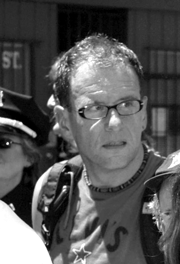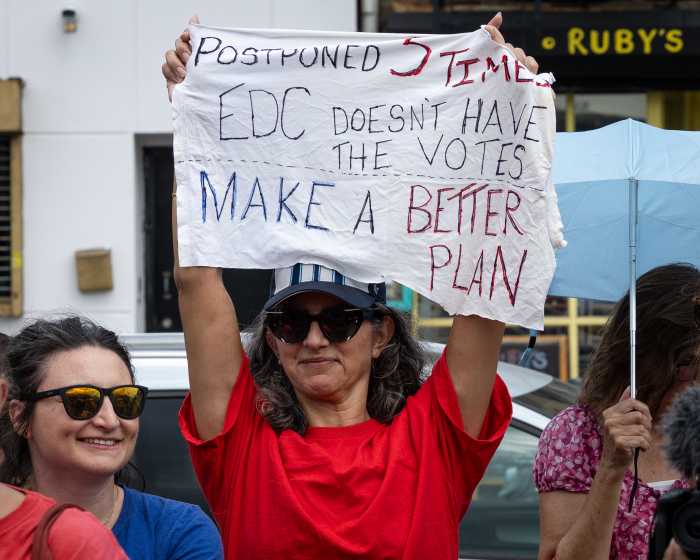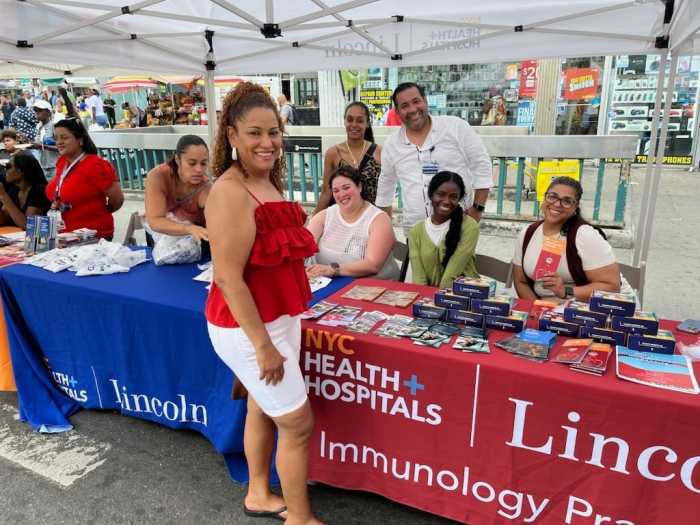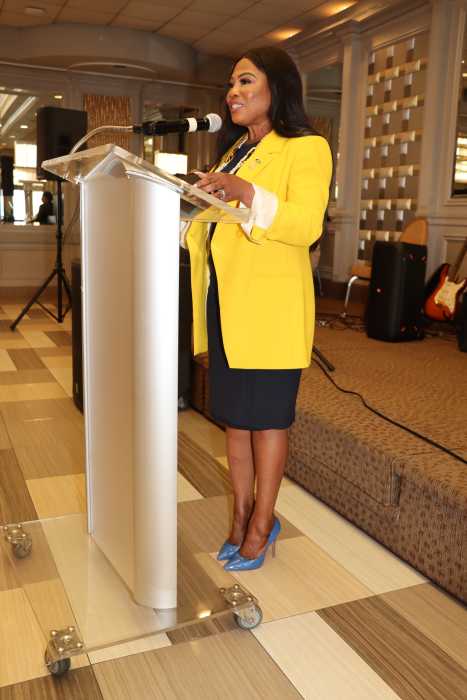Gay City News contributor a keenly inventive reporter, and a sweet, gentle soul
Joe Dignan, a gay freelance journalist whose work appeared in the Washington Post, the Bay Guardian, Bay Area Reporter, and Bay Times in San Francisco, the Sacramento News and Review, and, in dozens of stories over the past three years, in Gay City News, died on June 29.
Dignan, a resident of San Francisco’s Potrero Hill neighborhood who grew up in that city, died while working out at a gymnasium, apparently of a heart attack. He was 49.
Dignan began writing for Gay City News after paying a cold call on the newspaper while visiting New York in the summer of 2003. Since that time, he has covered the gay marriage ups and downs in San Francisco, the battle between the state Legislature and Republican Governor Arnold Schwarzenegger over a gay marriage bill passed but then vetoed late last summer, and the murder trial of three men charged in the 2002 murder of Gwen Araujo, a transgendered teen from Newark, California—across the Bay from the city—which resulted in two convictions last year.
Dignan also covered the 2004 Democratic National Convention in Boston for the newspaper.
His final article appeared in last week’s issue, about a 1966 resistance staged by drag queens and gay street youth against a police raid at San Francisco’s Compton’s Cafeteria—three years before the Stonewall Rebellion in the West Village. Dignan worked on the article with the newspaper’s editors into the evening last Wednesday, the day prior to his death.
Dignan wrote a variety of stories for the Washington Post, particularly regarding same-sex marriage developments in San Francisco and the state of California. For the Sacramento News and Review, he wrote a lengthy investigative story about arrests of gay men for outdoor cruising and sex.
Dignan, a graduate of the University of California at Berkeley, was also active in a variety of civic issues in San Francisco, most prominently as the chairman of the Committee to Save St. Brigid, a Romanesque-style Catholic Church at the corner of Broadway and Van Ness first built in 1863, with numerous re-buildings, but closed by the Archdiocese in 1994. The group was organized in 1993 when word of the closing was first announced and it sought to preserve both the exterior and interior of the building and to maintain its role as a house of worship.
Dignan advanced the cause of preserving the structure to the point where the Board of Supervisors is likely to approve landmark status for the church. However, there is no consensus around the maintenance of its interior, and late last year, the church completed sale of the building to the Academy of Art University, which intends to use the space for lectures and community events. The school’s purchase of the school ends the structure’s use for worship and threatens its interior integrity in the view of the preservationists.
Dignan risked arrest last fall when he and two other members of the Committee attempted to block the removal of religious objects by staff of the Archdiocese. The immediate conflict was defused, but Dignan remained unappeased.
“St. Brigid has been the spiritual home of tens of thousands of San Franciscans,” Dignan, who attended the parish as a child and baptized his 13-year-old daughter there, was quoted as saying in the San Francisco Chronicle, in a typical comment. “It resonates in our lives and the lives of our ancestors.”
“St. Brigid is my spiritual home,’’ Dignan said in 1999, also as quoted in the Chronicle, which noted that he grew up on nearby Lombard Street. “I’ve never been a good Catholic, but I still feel that St. Brigid is good for my spirit and this is true for countless members who, like me, are feeling a gut- wrenching sense of loss and bereavement.’’
Colleagues of Dignan’s on the St. Brigid Committee were among the first to offer comment when news of his death spread in San Francisco. Beatriz St. John, a fellow board member of his, posted a Web message reading: “He was a passionate crusader and wonderful leader who brought great energy to the work of the Committee. He was instrumental in the present landmarking efforts.”
Robert Bryan, an attorney who preceded Dignan as chairman of the Committee, told the Chronicle, “I had hundreds of conversations and meetings with him over the good fight for the church. Joe was an eloquent speaker, very smart, a superb leader and friend who will be sorely missed.”
Political leaders in California also responded with sorrow at news of Dignan’s death.
“All of us at Equality California are deeply saddened by the passing of Joe Dignan”, said Seth Kilbourn, the political director of Equality California, the state’s LGBT lobbying group. “Our collective heart goes out to his daughter Mary during this difficult time. Joe was remarkably tenacious about getting the story and his passion, along with his writing and deep-rooted activist spirit, will be sorely missed in the community.”
Mark Leno, the out gay San Francisco Democratic state assemblyman who is the chief force behind the California marriage rights bill, told the Chronicle, of Dignan, “He was a wonderful and unique San Francisco spirit. He was tenacious, creative, and passionate—about his writing, about St. Brigid, and about his incredible daughter, Mary. I can see him with his writing pads and cell phone and with his daughter and dog in tow. He was always on to the next cause, story, event.”
The most poignant comment came from Dignan’s daughter Mary, who had shared time between San Francisco and his ex-wife’s home near Sacramento.
Describing her father as “really fun, really crazy, just like a big friend,” Mary told the Chronicle, “I really loved him. I am staying strong for him, as I don’t think he would want me to curl up in a ball and cry. He would want people to be happy when they remembered him.”
The funeral for Joe Dignan was private.
gaycitynews.com































